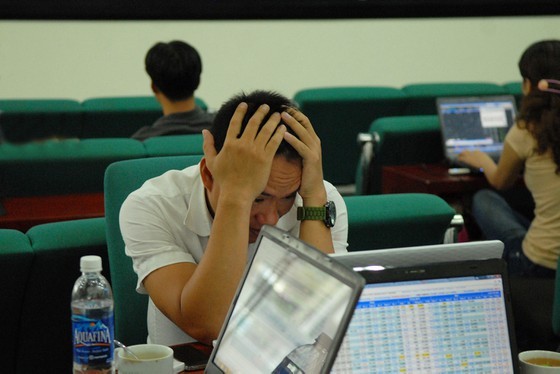
Vietnam’s stock market went through the worst week in history as investors’ sentiment was seriously affected after the country confirmed more Covid-19 cases. The market had to face with trading sessions with large-cap stocks being dumped heavily to the price floor and no buyers.
In the week from March 9 to 13, the VN-Index had slashed roughly 130 points compared to the previous week to 761.78 points. The total market capitalization had lost VND613 trillion ($26.3 billion) to VND4.1 quadrillion. The market capitalization of the Ho Chi Minh City Stock Exchange (HoSE) alone declined more than VND443.01 trillion ($18.9 billion) from VND3 quadrillion to VND2.6 quadrillion. Noticeably, in the trading session on March 9, Vietnam’s benchmark VN-Index plunged nearly 56 points, or nearly 6.3 percent, the steepest drop of the market since 2002.
Explaining this sharp plunge, Mr. Tran Van Dung, Chairman of the State Securities Commission, said that it was inevitable for Vietnam’s stock market to make a sharp correction as the trading session coincided with the fall of various bad news. The global oil price dropped and sometime fell by up to 30 percent. Amid the above developments, Goldman Sachs forecast that the Brent oil price will continue to decline further to $20 per barrel this year.
On the same day, the Japanese Government announced that economic data in 2019 were worse than forecast, increasing concerns that the global economy might fall into a recession, especially amid more and more serious impacts of the Covid-19 pandemic. The US Federal Reserve decided to cut its interest rates sooner than its regular meeting in March and now has lowered interest rates to near zero percent. This is a record interest rate cut in several years.
This has raised concerns about the US and global economic downturn. The investment cash flow tended to shift to safe assets, namely bonds and gold. Negative news along with the main factor - the complicated developments of the Covid-19 pandemic – immediately affected badly the sentiment of investors around the world.
After the lunar New Year, foreign investors had net sold for a whole seven weeks on the HoSE with a total value of nearly VND5.76 trillion. In February, they net sold up to more than VND2.8 trillion, the highest sell-off in a month since 2010.
The developments of the Covid-19 outbreak made Vietnam’s stock market suffer strong selling pressure from foreign investors. The week that the stock market plummeted was also because foreign investors kept selling heavily with 88.5 million shares, worth VND2.06 trillion, up 40 percent compared to the previous week.
Just in a week, the VN-Index had lost nearly 130 points so many investors suffered huge losses when bottom fishing in the black Monday, the trading session that the benchmark collapsed nearly 6.3 percent. If investors used financial leverage, the loss would be higher. Many investors did not have the cash to save the accounts that will be forced to sell by securities companies. Ms. N.C, a longtime investor, said that just in a week, her account evaporated more than 50 percent because she held gas and oil and blue-chip stocks.
Many experts said that there were many reasons that caused investors to dump shares heavily, including strong withdrawals of foreign investors that made a shortage of cash flow in the market, urging investors to cut losses to protect their portfolios. When the stock prices fall by more than 30 percent, it is inevitable to lead to the handle of margin calls.
In fact, not only individual investors but also institutional investors, or even foreign funds, are selling shares heavily, showing that they still concern over the developments of the stock prices in the future. A big factor that is dominating the sentiment of many investors is that sell-offs are taking place on trading floors all over the world.
The US stock market and other stock markets had to use circuit breakers and halt trading to prevent panic selling. In comparison with the global market, the losing momentum of Vietnam’s stock market remained modest as the price range on the HoSE is limited at 7 percent. As the global stock market will continue to decline, the VN-Index will be unable to move inversely.
The representative of VNDIRECT Securities Company said that for short-term investors, they should not sell shares as the market might be near a short-term bottom during this time but wait for a short-term recovery of the market to lower the proportion of shares and increase the proportion of cash, and especially restrict the use of margin at this time to reduce short-term risks.
As for long-term investors, they might consider disbursing a small proportion of 20-30 percent of the value of long-term investment portfolios when the market retreats to the support level of 700-800 points and prioritizing enterprises that are not affected much by the Covid-19 pandemic, such as technology, essential goods, fertilizer industries, or the export industries that Vietnam has the autonomy in the supply of raw materials and are expected to recover robustly when the Covid-19 pandemic passes, such as fisheries industry.
In the week from March 9 to 13, the VN-Index had slashed roughly 130 points compared to the previous week to 761.78 points. The total market capitalization had lost VND613 trillion ($26.3 billion) to VND4.1 quadrillion. The market capitalization of the Ho Chi Minh City Stock Exchange (HoSE) alone declined more than VND443.01 trillion ($18.9 billion) from VND3 quadrillion to VND2.6 quadrillion. Noticeably, in the trading session on March 9, Vietnam’s benchmark VN-Index plunged nearly 56 points, or nearly 6.3 percent, the steepest drop of the market since 2002.
Explaining this sharp plunge, Mr. Tran Van Dung, Chairman of the State Securities Commission, said that it was inevitable for Vietnam’s stock market to make a sharp correction as the trading session coincided with the fall of various bad news. The global oil price dropped and sometime fell by up to 30 percent. Amid the above developments, Goldman Sachs forecast that the Brent oil price will continue to decline further to $20 per barrel this year.
On the same day, the Japanese Government announced that economic data in 2019 were worse than forecast, increasing concerns that the global economy might fall into a recession, especially amid more and more serious impacts of the Covid-19 pandemic. The US Federal Reserve decided to cut its interest rates sooner than its regular meeting in March and now has lowered interest rates to near zero percent. This is a record interest rate cut in several years.
This has raised concerns about the US and global economic downturn. The investment cash flow tended to shift to safe assets, namely bonds and gold. Negative news along with the main factor - the complicated developments of the Covid-19 pandemic – immediately affected badly the sentiment of investors around the world.
After the lunar New Year, foreign investors had net sold for a whole seven weeks on the HoSE with a total value of nearly VND5.76 trillion. In February, they net sold up to more than VND2.8 trillion, the highest sell-off in a month since 2010.
The developments of the Covid-19 outbreak made Vietnam’s stock market suffer strong selling pressure from foreign investors. The week that the stock market plummeted was also because foreign investors kept selling heavily with 88.5 million shares, worth VND2.06 trillion, up 40 percent compared to the previous week.
Just in a week, the VN-Index had lost nearly 130 points so many investors suffered huge losses when bottom fishing in the black Monday, the trading session that the benchmark collapsed nearly 6.3 percent. If investors used financial leverage, the loss would be higher. Many investors did not have the cash to save the accounts that will be forced to sell by securities companies. Ms. N.C, a longtime investor, said that just in a week, her account evaporated more than 50 percent because she held gas and oil and blue-chip stocks.
Many experts said that there were many reasons that caused investors to dump shares heavily, including strong withdrawals of foreign investors that made a shortage of cash flow in the market, urging investors to cut losses to protect their portfolios. When the stock prices fall by more than 30 percent, it is inevitable to lead to the handle of margin calls.
In fact, not only individual investors but also institutional investors, or even foreign funds, are selling shares heavily, showing that they still concern over the developments of the stock prices in the future. A big factor that is dominating the sentiment of many investors is that sell-offs are taking place on trading floors all over the world.
The US stock market and other stock markets had to use circuit breakers and halt trading to prevent panic selling. In comparison with the global market, the losing momentum of Vietnam’s stock market remained modest as the price range on the HoSE is limited at 7 percent. As the global stock market will continue to decline, the VN-Index will be unable to move inversely.
The representative of VNDIRECT Securities Company said that for short-term investors, they should not sell shares as the market might be near a short-term bottom during this time but wait for a short-term recovery of the market to lower the proportion of shares and increase the proportion of cash, and especially restrict the use of margin at this time to reduce short-term risks.
As for long-term investors, they might consider disbursing a small proportion of 20-30 percent of the value of long-term investment portfolios when the market retreats to the support level of 700-800 points and prioritizing enterprises that are not affected much by the Covid-19 pandemic, such as technology, essential goods, fertilizer industries, or the export industries that Vietnam has the autonomy in the supply of raw materials and are expected to recover robustly when the Covid-19 pandemic passes, such as fisheries industry.
























